2013年新人教版七年级英语下册
2013人教版七年级英语下册units1-12重点短语和句子及范文
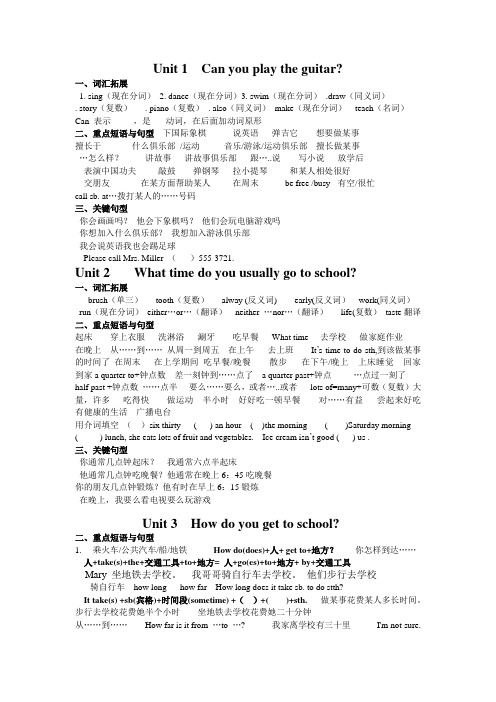
Unit 1 Can you play the guitar?一、词汇拓展1. sing(现在分词)2. dance(现在分词)3. swim(现在分词).draw(同义词). story(复数). piano(复数). also(同义词)make(现在分词)teach(名词)Can 表示- ------,是-----动词,在后面加动词原形二、重点短语与句型下国际象棋说英语弹吉它想要做某事擅长于什么俱乐部/运动音乐/游泳/运动俱乐部擅长做某事…怎么样?讲故事讲故事俱乐部跟…..说写小说放学后表演中国功夫敲鼓弹钢琴拉小提琴和某人相处很好交朋友在某方面帮助某人在周末be free /busy 有空/很忙call sb. at…拨打某人的……号码三、关键句型你会画画吗?他会下象棋吗?他们会玩电脑游戏吗你想加入什么俱乐部?我想加入游泳俱乐部我会说英语我也会踢足球Please call Mrs. Miller ()555-3721.Unit 2 What time do you usually go to school?一、词汇拓展brush(单三)tooth(复数)alway (反义词) early(反义词)work(同义词)run(现在分词)either…or…(翻译)neither …nor…(翻译)life(复数)taste翻译二、重点短语与句型起床穿上衣服洗淋浴涮牙吃早餐What time 去学校做家庭作业在晚上从……到……从周一到周五在上午去上班It’s time to do sth,到该做某事的时间了在周末在上学期间吃早餐/晚餐散步在下午/晚上上床睡觉回家到家a quarter to+钟点数差一刻钟到……点了 a quarter past+钟点…点过一刻了half past +钟点数……点半要么……要么,或者…..或者lots of=many+可数(复数)大量,许多吃得快做运动半小时好好吃一顿早餐对……有益尝起来好吃有健康的生活广播电台用介词填空()six thirty ( ) an hour ( )the morning ( )Saturday morning ( ) lunch, she eats lots of fruit and vegetables. Ice cream isn’t good ( ) us .三、关键句型你通常几点钟起床?我通常六点半起床他通常几点钟吃晚餐?他通常在晚上6:45吃晚餐你的朋友几点钟锻炼?他有时在早上6:15锻炼在晚上,我要么看电视要么玩游戏Unit 3 How do you get to school?二、重点短语与句型1. 乘火车/公共汽车/船/地铁How do(does)+人+ get to+地方?你怎样到达……人+take(s)+the+交通工具+to+地方= 人+go(es)+to+地方+ by+交通工具Mary 坐地铁去学校。
2013年新人教版七年级(初一)英语[下册][全册]教(学)案
![2013年新人教版七年级(初一)英语[下册][全册]教(学)案](https://img.taocdn.com/s3/m/f173742cfad6195f312ba6b0.png)
2013年新人教版七年级(初一)英语下册全册教案Unit 1 Can you play the guitar?Section A (1a-2d)一、教学目标:1. 语言知识目标:1) 能掌握以下单词:guitar, sing, swim, dance, chess, play chess, draw, speak, speak English,join, club能掌握以下句型:①—Can you play the guitar? —Yes, I can./ No, I can't.②—What can you do? —I can dance.③—What club do you want to join? —I want to join the chess club.2) 能了解以下语法:情态动词can的用法want to do sth.的用法2. 情感态度价值观目标:该部分内容贴近学生的生活,谈论的话题是能力。
通过互相询问或谈论自己或对方在某一方面的能力,可以培养学生的一种群体意识。
二、教学重难点1. 教学重点:1) 学习询问和谈论彼此的能力和特长;2) 掌握一些弹奏乐器的表达方式。
2. 教学难点:情态动词can的构成和使用。
三、教学过程Ⅰ. Lead in1. 教师可携带一些易于演奏的乐器,也可带一些演奏乐器的图片,一边演示乐器,一边说: I can play the guitar.…等;再指着图片说:He/She can play the violin.ButI can’t play it.等;然后询问学生:Can you play the guitar?….并引导学生进行简单的回答。
2. Ss look at the picture in 1a. Then read the words and phrases. Let Ss matchthe activities with the people.Then Check the answers with the class together.Ⅱ. Presentation出示一些反映各种活动的图片、幻灯片或播放课件,引导学生谈论活动:He/She can dance/swim/sing/"··But I can’t dance/swim/sing/...等,学习表达活动的动词短语。
人教新目标版2012—2013年度下学期七年级英语教案

人教新目标版2012—2013年度下学期七年级英语教学案授课教师__________2013年2月28日Unit 1 Can you play the guitar?一. Knowledge and abilities goals:1.vocabulary:dance,swim,sing,play chess , paint ,speak English, play the guitar2. How to use Model verb” can”.3. Listening and speaking skills and communicative competence.二. Teaching method: Listening and speaking methods. Pair works.三. Moral goals: Encourage students to express their abilities.Content of courses:In this period, students will learn some names of clubs ,such as art , music, chess club, swimming club, etc. students will learn the drills :Do you want to join…club ?Can you …?四. Importance and difficulty: canTeaching Aids: A tape recorder. Some pictures. A projector Some sports things, such as volleyball, basketball, etc. Preparation test paper for lessons before class.五. Teaching Time: 4 periodsPeriod 1 (Section A: 1a-2d)授课人:______ 授课班级: _____ 授课时间:2013年___月___日____午第____节1.Knowledge Objects: Learn to talk about abilities.Know something about the culture of clubs. Can you/he..?What can you do? What club do you want to join?can, can’t, draw, dance, swim, speak, walk.2.Teaching key point: can3. Teaching Difficult point: can4.Teaching Procedures:Step 1. Lead-inEnjoy a song I’m a musicianT: Do you want to be a musician? S:T: Can you play the piano? S…T: What can you do? S: I can…T: What about you? S:T: OK, now please show your talent and tell us what you can do.Ask one of the students come to the front and do the action. Ask other students to guess what he or she can do.Step 2. PresentationT: Look at the pictures. What are they doing? S:Step 3 Pair workLook at the pictures. Ask and answer like this:A: Can you play basketball?B: Yes, I can. / No, I can’t.Can you…?Step 4 PresentationShow some pictures of famous stars. Practice the third person “he, she, they”T: Where can you play chess? S:T: Yes, in a chess club. This term, we have a lot of clubs. What club do you want to join? S…T: Sounds great. Can you…?S: Yes, I can/ No, I can’tIf the answer is negative, guide students to say:S: No, I can’t. But I can learn it from others.Step5 Pair workA: What club do you want to join?B: I want to join the…A: Can you …?B: Yes, I can . No, I can’t. But I can learn it from others.Step 6 ListeningListen to 1bListen to 2a and 2b. Tell them to give special attention to listening activity (names of the clubs). Finish the tasks.Step 7 Pair workLook at 2b and talk about what the people can do the clubs they want to join.Step 7 Role-play the conversation 2dT: If you like telling stories. What club can you join?S: Story telling club.T: Right. Please read the conversation following the recording. Who wants to join the story telling club? Then role-play the conversation.Step 8 Explain some language points.Step 9 HomeworkReflection after class:_________________________________________________________________________________ _________________________________________________________________________________ ______________________________________________________________________________Period 2 (Section A: 3a-3c)授课人:______ 授课班级: _____ 授课时间:2013年___月___日____午第____节1. Knowledge Objects: go on learning to talk about abilities.—Can you play the guitar? —Yes, I can./ No, I can't.—What can you do? —I can dance.—What club do you want to join? —I want to join the chess club.2. Teaching key points: Conclude the usage of ‘can’; put all new language into practice through different activities.3. Teaching Difficult points: Distinguish “say, speak, tell, talk”4.Teaching Procedures:Step1:Greeting, Warming up and duty report.Watch a flash about the content of the Just for fun.Talk something about the flash: Why is the other boy unhappy?Introduce because of the difference of time zones, the time in different places are different. Revision: show the time in six places: Beijing, Tokyo, Paris, Los Angeles, New York, and London. Elicit the sentence pattern: What time is it?It’s……Draw attention to the “am” and “pm”. For instance, Beijing is seven o’clock in the morning. We can say Beijing is seven am. Los Angeles is three in the afternoon. So we can say Los Angeles is three pm. (teacher helps students answer).Step2:Review the words learnt in the last period and add more.(1)T:Here are some Chinese, let us see what time do they usually get up/ take a shower…get up take a shower eat breakfast go to school eat lunch run go homedo homework eat dinner go to bed(2)ask students to make a surveyAsk your friend 5 questions about his /her day. Then make a report.A: What time do you usually…?B: I usually…at…Step3:presentation.(1)Ben’s day. Introduce something about Ben.Using the sentence pattern: What time does he usually get up/go to school/…Pay attention to the verb form of the third person.Discuss Do you like ben’;s routines.(2)Show the picture of Scott. He usually gets up at 5 pm.Ask students to predict what his job is?(3)listen to the tape,and try to answer this question. then read through the passage,and match the pictures with the times.(4)read it again and fill in the chart.(5)answer the following questions1.Where does he work?2.How does he go to work?Step4:Work on 3a.(1)Read through the passage and tell me what his job is.(2)Read it again and match the pictures.(3)Answer questions:What does he do after he get up?Does he go to work after breakfast? What does he do?How does he go to work? By bus or on foot?What does he do before he goes to bed?What does“What a funny time to eat breakfast!”mean?Step5:Follow up.T:My friend Da Bao likes Scott's work, so he gets to Sai Te Hotel . But he doesn't find him.T: There are many children in the hotel. Look, they are coming. Please ask them questions to find the real Scott.Step6:Work on part4.T:Now six people make a group, and ask the other students when they usually go to bed . The leader lines up from the earliest to the latest bedtime.T: Let's listen Group1…Group2…Step7:Work on part 3 of self –check.T: Now I want to know something about what you do on weekends. You can go, ask your classmates and fill in the forms. Then you have a report.T: You may begin it like this "Ma Li gets up at …"Step8:Homework.Oral work:(1)Read 3a and recite it.(2)Go on making a survey to find out what your classmates do on weekends.Reflection after class:__________________________________________________________________________________________________________________________________________________________________ __________________________________________________________________________Period 3 (Section B: 1a-1f)授课人:______ 授课班级: _____ 授课时间:2013年___月___日____午第____节1. Knowledge Objects: go on learning to talk about abilities. drum, play the drum, piano, play the piano, violin, play the violin2. Teaching key points: Improve listening and speaking3. Teaching Difficult points: Improve listening and speaking4. Teaching Procedures:Step 1 Warming- up and revisionDaily greeting.Check the homework. Let some Ss report what his/her family members can do.Step 2 PresentationPlay the sound of different kinds of instruments. Let Ss guess what it is.Act and show your classmates your talent.T: Please stand in front of your classmates. Act and say what you can.S1: (sing and dance) I can sing and dance.S2: (play the drum) I can play the drum..Step 3 ListeningTell the Ss that they will listen to some sounds of the instruments. Listen and number the words [1-4] in the order of the sounds you hear in 1a.Play the recording again and check the answers.T: Now let's work on 1c. First, let one student read the words and phrases aloud.Then listen to the 1d and circle the words and phrase you hear.Check the answers:T: Now please look at the chart in 1e. What can Bill, Cindy and Frank do? What can't they do? You'll listen to the recording again. Then try to fill in the blanks.Step 4 Group workWork in groups. Take turn to talk about what Bill, Cindy and Frank can and can't do.S1: Bill can play the guitar, but he can't sing.S2: Cindy can sing and play the drum, but he can't play the piano.Teacher can walk around the classroom, and give some help to the Ss.Step 5 HomeworkMake up a conversation between a volunteer and a person who is in charge of a sports club/old people’s home/music club.Reflection after class:__________________________________________________________________________________________________________________________________________________________________ _________________________________________________________________________________Period 4 (Section B: 2a-self check)授课人:______ 授课班级: _____ 授课时间:2013年___月___日____午第____节1. Knowledge Objects: go on learning to talk about abilities. also, people, help (sb) with sth, center,home, today, be good with, make, make friends, weekend, on weekends/on the weekend, teach, musician2. Teaching key points: Also, too; be good with, help with3. Teachi ng Difficult points: Describe one’s ability4. Teaching Procedures:Step 1 Warming-upCheck the homeworkAsk some pairs to show their conversationsStep 2 ReadingFirst, show some pictures of the boys and girls and some key words in 2a.T: Here are some pictures and information about Peter, Alan and Ma Huan. Can you describe them according to the pictures and key words?S1: Guide Ss to use “also, too”, and distinguish how to use these two words.Give comments on Ss’ descriptions.T: Now we’ll read three ads. What's the main idea of each ad? What's each ad's title? Now let's read the three ads and select a title for each ad. Ss read carefully and try to select a title for each ad. Check the answers with the class.Step 3 Review the usage of “tell”,Review and distinguish the usage and function of “help”T: Suppose Peter, Alan and Ma Huan want to help to do something after school. Which ad is right for him/her? Now read the descriptions in 2a and the ads in 2b again. Select a right ad for each person. Ss read the descriptions in 2a and the ads in 2b again. Try to select a right ad for each person. They can talk about the answers in their groups.Check the answers with the class.Step 4 Homework1. Recite 2a and 2b2. Finish the exercise on p6Reflection after class:_________________________________________________________________________________ _________________________________________________________________________________ ______________________________________________________________________________Unit 2 What time do you go to school?1. Teaching Aims:1) Aims of Basic Knowledge:①V ocabulary: time, shower, usually, O’clock, what time, go to school, take a shower.②Grammar: What time do you…? What time does he / she…?③ Function: Use the simple tense to talk about the daily life.2) Aims of Abilities: Listening skill. Speaking skill. Reading skill. Writing skill.3) Aims of Emotion: Love life.2. Analysis of the Material:1) Brief Introduction of the teaching material:What time / When do you…?” “ What time / When does he…?”2) Teaching Focus: What time do you…? What time does he/ she…?3) Teaching Difficulties: Present tense.3. Learning Methods: Make a plan. Culture.4. Teaching Methods: Student- centered. Task-based Teaching.5. Teaching Time: 4 periodsPeriod 1(Section A: 1a-2a)授课人:______ 授课班级: _____ 授课时间:2013年___月___日____午第____节Step One: Warming-upGreetingT: Good afternoon, everyone.Ss: Good afternoon, Miss Yang.Step Two: Presentation1.Adjust the time, and ask students questions.T: What time is it? Ss: It’s 12 o’clock. ( Write on Bb )( Help Ss to say )T: What time is it? Ss: It’s 10:15.( Help Ss to say )2.Ask one student to come to the front, adjust the time and ask the other students.S1: What time is it? Ss: It’s 9 o’clock.3.Teach the new words & phrases.Show some pictures of different clocks and the activities.T: I’m very busy these days. Can you guess what time I get up / eat breakfast / go to school / run / take a shower? ( Write on Bb)T: I usually get up at 6:35. ( Teach Ss the new word “ usually” )S1: You usually eat breakfast at …S2: You usually run at…S3: You usually take a shower at …4.Ask Ss to do the exercise of 1a, and then check the answers.Step Three: Listening1.Show Ss the timetable of Rick’s ( write on small Bb )Ask Ss listen to the recorder and fill in the chart.Then check the answers.2.Ask and answer.T: What time does Rick get up / eat breakfast / run / go to school / take a shower ?Ss: He gets up / eats breakfast / runs / goes to school / takes a shower at…( Ask Ss pay attention to the underlined phrases.)Step Four: Consolidation1.Ask Ss to look at the pictures and tell their days.Example: I usually get up at …. I eat breakfast at …. I go to school at …. At …, I take a shower.Step Six: Homework1.Try to remember all the words & phrases.2.Survey: Ask your classmates their routines, and give your report.3.Plan: January 1st is coming. Please plan it, and make your day wonderful.Step Seven Blackboard DesignReflection after class:_________________________________________________________________________________ _________________________________________________________________________________ ____________________________________________________________________Period 2 (Section A: 2b-Grammar Focus)授课人:______ 授课班级: _____ 授课时间:2013年___月___日____午第____节1. Aims and demands :1) Language skills :Ss learn to talk about kinds of transportation, and how long it takes to go places, and how far apart places are.2) Target Language : Words : how far , get to , bicycle , subway , bus stop, train station , minute, kilometer, mile , transportation , calendarSentences: How do you get to school ? / How long does it take ? / How far is it ?3) Moral object : Through learning this unit , Ss can enable them to care for each other whenever crossing the roads and pay attention to the sign of traffic.2. Analysis of the material:Students have learned the transportation before.. In this unit ,they need to learn more details about the transportation. At the same time ,they need to learn “How long and How far” and they can use them freely.3. Teaching methods:pairwork , groupwork ,listening and speaking, practicing4, learning strategies:Personalizing Inferring vocabulary5.Teaching aids:Tape recorder, a projector or a computer6.Teaching period:Four periods.Period 3 (Section B: 3a-3c)授课人:______ 授课班级: _____ 授课时间:2013年___月___日____午第____节1. Aims and Demands: Key vocabulary, How do you get to school ? How does he get to school ?2. Teaching methods : Listening Writing Pairwork3. Teaching Aids : A tape recorder.Step I Leading inT: Good morning, everyone! You know I live far away ,so I go to school by bus every day. What about you? David, “How often do you go to school?”S:--------T: So we will talk about how to get to places in this unit.Step IINow I will show you pic tures and let’s review the transportations we know. Then we will learn more about it .(take the subway) Please open your books and finish 1a.Step III1. There are five names in 1b.Now they are in the picture. We should find them.2. Play the tape .They should listen carefully and find the persons .Write the numbers next to the correct students in the picture above. After listening , check the answers together .Step IVPoint to the example in the box , ask two students to read it .then ask them to make up their conversations about how the people in the picture get to school .Teacher choose some pairs to act their conversations.Step VPracticing the listening :T: I will play two conversations The people are talking about how students get to school and how long it takes .The first time check the kinds of transportation that you hear. The second time match the time with the kinds of transportation activity 2a.Step VI1. Pay attention to the picture and dialogue.2. Make your own dialogue into pairs.3. Act it in front of the students.Step VIISummary and homework: This class we have learnt some key vocabulary and the target language .I hope after class you can survey how does your friends get to school .and pre-revise the 3a,3b.Step VIII Blackboard DesignReflection after class:_________________________________________________________________________________ _________________________________________________________________________________ _______________________________________________________________________________Period 2 (Section A: 3a-3c)授课人:______ 授课班级: _____ 授课时间:2013年___月___日____午第____节1. Aims and demons: Key vocabulary : minute hour second take some body some time to do sth.Kilometer2. Teaching Methods : Reading and writing Pairwork3.Teaching Aids : Recorder A projectorStep I Reading1. Pay attention to these questions.2. Read this text by yourself and try to answer the questions3. Explain the text and check the answers.Step II Pairwork1. Pay attention to the conversation on the right.2. Read this text in different roles.3. Look at the picture and time on the left.4. Make the other conversations in pairs.(Give them five minutes)Step III ( Into group race)Three students a group. A ,look at page 21.B, look at page 85.C, look at page 86.If they want to get the answers in the chart ,they should ask the others questions.eg:1. How often does John go to school?2.How long does it take Maria to get to school?Get the answers from the conversations .At the same time ,they can practise the basic sentences in this unit.Step V WorkbookComplete these questions and answers.1. Q: How does she get to school? A: She takes the bus.2. Q; How do ____get to school? A:I _____my bike.3. Q:______ does he get to school? A: He ____ the subway.Step VI SummaryThis class we’ve had reading and writing practice. And we’ve done a game.Step VII HomeworkFinish off the workbook exercise.Reflection after class:_________________________________________________________________________________ _________________________________________________________________________________ ________________________________________________________________________Period 3 (Section B: 1a-2b)1. Aims and Demands: Key vocabulary: bus stop, bus station, train station, subway station.2. Teaching Methods: Listening methods. Reading methods. Pairwork. Groupwork. Practice.3. Teaching Aids: A tape recorder, a projector.Step ISection B 1a , Ss match the words with the pictures .Ask them to recognize the different stations. Check the answers together .Step IIPracticing listening : Play the tape twice , the first time please give out the general meaning . the second time check the things that Tomas wants to know. The third time how does Nina get to school? Step IIIPracticing reading :T: class , Do you want to know the students around world how to get to school ? ok, please read silently the article. (1 minute later ) T: Who can tell me the main idea of the article .? Good ,look at the five sentences, write T or F. Ss check the answer each other.Step IV 2bStudents look at the chart first. Make sure they know what to do. Ask them to finish the activity individually according to the chart. Then check the answers.Step V SummaryToday we have learnt some more key words and done some reading and writing practice.Step VI Home workPreview the 2b and finish the self check.Reflection after class:_________________________________________________________________________________ _________________________________________________________________________________ ________________________________________________________________________Period 4 (Section B: 2c-Self check)1. Aims and Demands: Writing practice ,make a survey, exercises over the workbook.2. Teaching Methods: Writing method, speaking method, self check method.3. Teaching Aids: A projector.Step 1 2cJust now you filled in an article about how students get to Hillsville High School. How do students get to your school?As a students say, list them on the board. Tell students to use the words on the board to write about how students at your school get to school.Ask students to write individually.Choose some students to read their work to the class.Give them little present s if they do well.Step II 4 Survey Find someone who…Tell students we’ll do a survey. Please turn to page 92.First look at the chart. You want to know how far people live from school, how they get to school, and how long it takes them to get to school. Let me tell you how to do the survey. Go around the class and ask questions like this:How far do you live from school?How do you get to school?How long does it take to get to school?And find out these answers and write them names in the chart. The students with the most names in his or her chart wins the game.Step III Self checkTell them to use the words in the box to fill in the blanks. Ask them to do this exercise individually. After finishing, write some on the board .Underline any mistakes and ask students to tell how to correct each of them.Step IV 2Show the picture on the screen. Tell them imagine you meet an American who needs help. His friend is ill in hospital .He has got a map .But it’s a Chinese map. He doesn’t know Chinese. Can you tell him how to get to the hospital?Students work in pairs to present their conversations to the class.Step V SummaryToday we’ve reviewed key vocabulary in the unit and done writing and oral practice.Step VI HomeworkFinish off the exercise of the workbook and preview the next unit.Reflection after class:_________________________________________________________________________________ ________________________________________________________________________________________________________________________________________________________Unit 4 Don’t eat in class.Ⅰ. Analysis of the Teaching Material1.Status and FunctionIn this unit students learn to talk about school and family rules.Such a topic is so familiar to students that they must be active in all the activities in class.It is helpful to raise learning interest and useful to improve students’ listening,speaking,reading and writing skills.(1)The first period introduces some negative imperatives first.Then students are provided with much listening and oral practice using the target language “What are the rules?”(2)In the second period students do much listening and oral practice using the words “can” and “can’t”.After this class,students know more about what they can or can’t do at school.(3)The third period provides students with much oral practi ce using the phrase “have to”.And the game in the last part is useful to raise learning interest.It is useful to improve spoken English.(4)In the fourth period students learn to talk about what they do or don’t have to do at home.(5)In the fifth period students learn to write a letter to talk about their family rules.And they also learn to talk about some common signs.All the activities are designed to improve students’ reading and writing skills.(6)The self check in the last period is designed to give students more reinforced practice,especially writing practice.In this way,students better understand how to apply what they have learned in their daily life.2.Teaching Aims and Demands(1)Knowledge ObjectsIn this unit students learn to talk about rules.Make students learn and grasp imperatives and the usage of the words “can” and “have to”.(2)Ability ObjectsTrain students’ listening,speaking,reading and writing skills.Train students’ integrating skills.(3)Moral ObjectAs students,we must obey school rules.3.Teaching Key PointsLearn the key vocabulary and the target language. Learn the imperatives and the words “can” and “have to”.4.Teaching DifficultiesTrain students’ listening,speaking,reading and writing skills. Learn to write a letter.5.Studying WaysTeach students how to talk about rules in daily life.Ⅱ.Teaching Guidancenguage Function: Talk about rules.2.Target Languages:Don’t eat in class! Can we wear hats? No,we can’t.We don’t have to weara school uniform.3.StructuresImperatives. Can for permission. Modal have to.4.Key Vocabularyin class, classroom, hallway, gym, arrive,hate,go out, practice, inside, outside, uniform, sports shoes,fight,can,can’t,have to5.Learning Strategies: Scanning. Deducing.Ⅲ. Periods: Six periods.Period 1 (Section A: 1a-2d)授课人:______ 授课班级: _____ 授课时间:2013年___月___日____午第____节Step 1 Revision Review some key words and language points learned in Unit 11 briefly. 1 2 345学校走廊Point to the pictures one by one and teach students to say, Don’t arrive late for class.Don’t run in the hallways.Don’t eat in the classrooms.Don’t listen tomusic in the classrooms.Don’t fight.Write the rules on the blackboard.Read and have students repeat several times.Students open their books. Point out the list of school rules.Invite a different student to readeach rule to the class.Step 2 Call students’ attention to the picture.Say, Each of these students is breaking one of these rules.Write the number of the rule eachstudent is breaking in the box next to him or her.Point out the sample answer.Students do the activity individually.Check the answers.Answers 1.boy looking at his watch2.boy running in the hallway3.girl eating an apple4.boywith headphones5.boys sitting at desks,fightingStep 3 1bAsk students to read the five rules in activity 1a once more.Point to the three names.Say,You are to listen to a conversation.Three students are breaking therules.Listen and write the number of the rules next to the name of the student who is breaking the rules.Play the recording for the first time.Students only listen.Play the recording again.This students listen and fill in the number of the rule after each name.Correct the answers.Answers Peter:2 Nicki:3 Joseph:4Step 4 1cInvite a pair of students to read the sample conversation to the class.Write it on the blackboard.Put students into pairs.Say,Student A is an exchange student.He or she doesn’t know the rules in the school.Student B tells him or her about the rules in 1a.Get students to work in pairs.As they are working,move around the room offering help as needed.Get some pairs of students to present their conversation to the class.(This activity provides oral practice using the target language.)Step 5 SummaryIn this class we’ve mainly learned to talk about school rules. As students, we must obey school rules.Step Ⅵ HomeworkWrite down the rules in activity 1a without looking at books.Reflection after class:_________________________________________________________________________________ _________________________________________________________________________________ _____________________________________________________________________________Period 2 (section A: 3a,3b,3c)。
2013新版人教版七年级下册英语单词表(按字母排序)全册
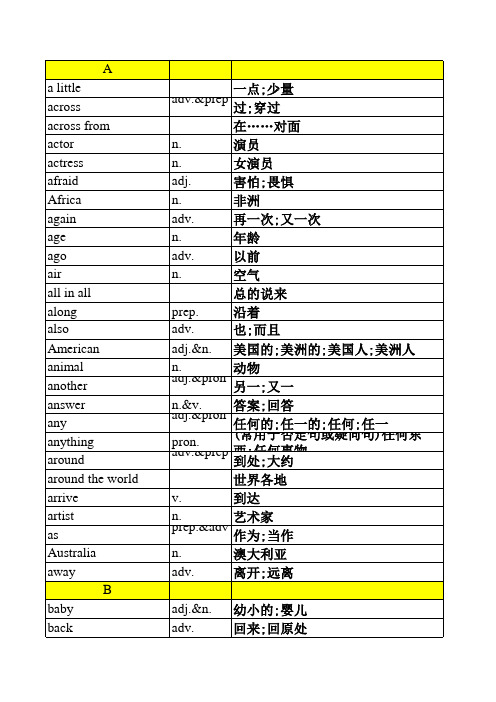
v.&n. 刷;刷净;刷子
build
n.
身材
bus butterfly by by bike
C cabbage cake call (sb) back camp Canada candle candy car cat center (=centre) cheap chess child (pl. children) cinema clean climb cloudy club cold come ture cook could country countryside cow crime
K keep kill kilometer (k=inkdilometre) kind of kitchen kite koala kung fu
L lake language large later lazy
adj.
n. adj. prep. n.
n. n. v. n. v. adv.
v. v. n. n.
铺床
许愿
结交朋友
做汤
n.
男人;人
adj.&pron. 许多
n.
(可食用的)肉
adj.
中等的
n.
信息;消息
v.
挤奶
给奶牛挤奶
minute miss money moon more mountain mouse (pl. mice) mouth move movie museum musician mutton
n.
家庭作业
n.
马
n.
医院
n.
主人;东道主
adj.
热的
n.
旅馆;酒店
n.
房子
num.
2013秋人教版七年级下册英语知识点及单词
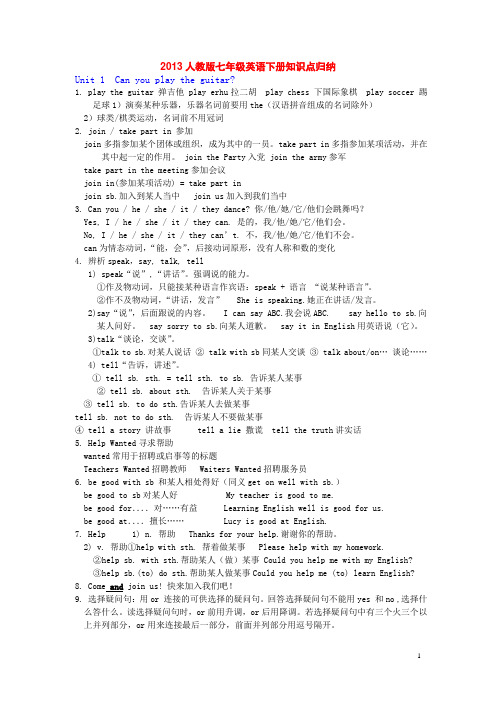
2013人教版七年级英语下册知识点归纳Unit 1 Can you play the guitar?1. play the guitar 弹吉他 play erhu拉二胡 play chess 下国际象棋 play soccer 踢足球1)演奏某种乐器,乐器名词前要用the(汉语拼音组成的名词除外)2)球类/棋类运动,名词前不用冠词2. join / take part in 参加join多指参加某个团体或组织,成为其中的一员。
take part in多指参加某项活动,并在其中起一定的作用。
join the Party入党 join the army参军take part in the meeting参加会议join in(参加某项活动) = take part injoin sb.加入到某人当中 join us加入到我们当中3. Can you / he / she / it / they dance? 你/他/她/它/他们会跳舞吗?Yes, I / he / she / it / they can. 是的,我/他/她/它/他们会。
No, I / he / she / it / they can’t. 不,我/他/她/它/他们不会。
can为情态动词,“能,会”,后接动词原形,没有人称和数的变化4. 辨析speak,say, talk, tell1) speak“说”,“讲话”。
强调说的能力。
①作及物动词,只能接某种语言作宾语:speak + 语言“说某种语言”。
②作不及物动词,“讲话,发言” She is speaking.她正在讲话/发言。
2)say“说”,后面跟说的内容。
I can say ABC.我会说ABC. say hello to sb.向某人问好。
say sorry to sb.向某人道歉。
say it in English用英语说(它)。
3)talk“谈论,交谈”。
①talk to sb.对某人说话② talk with sb同某人交谈③talk about/on…谈论……4) tell“告诉,讲述”。
2013年新人教版英语新目标七年级英语下册第1单元复习题及答案
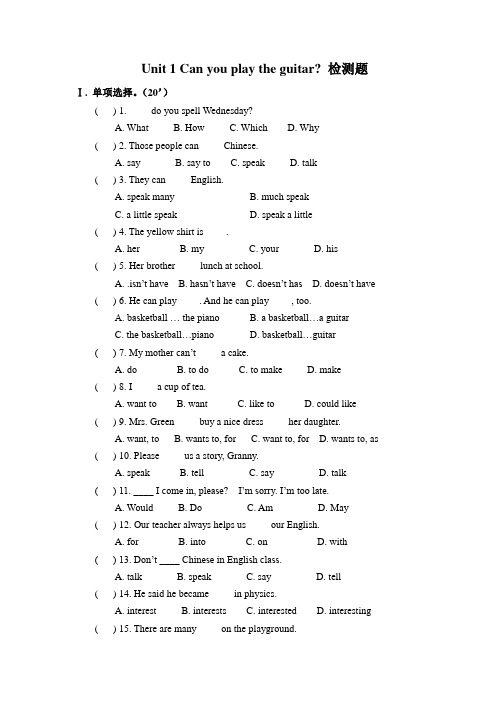
Unit 1 Can you play the guitar? 检测题Ⅰ. 单项选择。
(20’)( ) 1. ____ do you spell Wednesday?A. WhatB. HowC. WhichD. Why( ) 2. Those people can ____ Chinese.A. sayB. say toC. speakD. talk( ) 3. They can ____ English.A. speak manyB. much speakC. a little speakD. speak a little( ) 4. The yellow shirt is ____.A. herB. myC. yourD. his( ) 5. Her brother ____ lunch at school.A. .i sn’t haveB. hasn’t haveC. doesn’t hasD. doesn’t have( ) 6. He can play ____. And he can play ____, too.A. basketball … the pianoB. a basketball…a guitarC. the basketball…pianoD. basketball…guitar( ) 7. My mother can’t ____ a cake.A. doB. to doC. to makeD. make( ) 8. I ____ a cup of tea.A. want toB. wantC. like toD. could like( ) 9. Mrs. Green ____ buy a nice dress ____ her daughter.A. want, toB. wants to, forC. want to, forD. wants to, as( ) 10. Please ____ us a story, Granny.A. speakB. tellC. sayD. talk( ) 11. ____ I come in, please? I’m sorry. I’m too late.A. WouldB. DoC. AmD. May( ) 12. Our teacher always helps us ____ our English.A. forB. intoC. onD. with( ) 13. Don’t ____ Chinese in English class.A. talkB. speakC. sayD. tell( ) 14. He said he became ____ in physics.A. interestB. interestsC. interestedD. interesting( ) 15. There are many ____ on the playground.A. leafesB. leafC. leavesD. leafs( ) 16. -- Can you speak Russian?-- Yes, but only ____.A. littleB. a littleC. fewD. a few( ) 17. There is ____ water in the bottle. You have to get some.A. littleB. a littleC. fewD. a few( ) 18. Wang Wei is a ____ worker. She works very ____ in the factory and we all like her.A. well, wellB. good, goodC. good, wellD. well, good( ) 19. My grandpa doesn’t want ____ at home. He wants ____ out for a walk on Sunday.A. to stay, goB. stay, goC. stay, to goD. to stay, to go( ) 20. She can’t ____ the difference between the two cars.A. sayB. talkC. speakD. tellⅡ.连词成句。
人教版2013新目标七年级下册英语单词
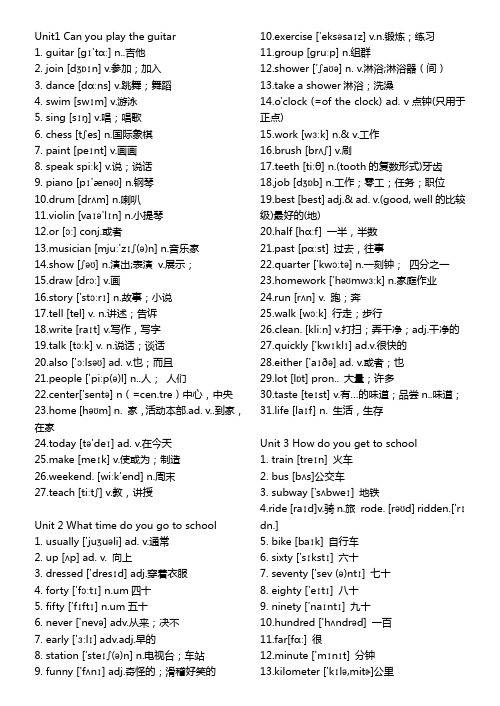
Unit1 Can you play the guitar1. guitar [gɪ'tɑː] n..吉他2. join [dʒɒɪn] v.参加;加入3. dance [dɑːns] v.跳舞;舞蹈4. swim [swɪm] v.游泳5. sing [sɪŋ] v.唱;唱歌6. chess [tʃes] n.国际象棋7. paint [peɪnt] v.画画8. speak spiːk] v.说;说话9. piano [pɪ'ænəʊ] n.钢琴10.drum [drʌm] n.喇叭11.violin [vaɪə'lɪn] n.小提琴12.or [ɔː] conj.或者13.musician [mjuː'zɪʃ(ə)n] n.音乐家14.show [ʃəʊ] n.演出;表演v.展示;15.draw [drɔː] v.画16.story ['stɔːrɪ] n.故事;小说17.tell [tel] v. n.讲述;告诉18.write [raɪt] v.写作,写字19.talk [tɔːk] v. n.说话;谈话20.also ['ɔːlsəʊ] ad. v.也;而且21.people ['piːp(ə)l] n..人;人们22.center['sentə] n(=cen.tre)中心,中央23.home [həʊm] n. 家,活动本部.ad. v..到家,在家24.today [tə'deɪ] ad. v.在今天25.make [meɪk] v.使或为;制造26.weekend. [wiːk'end] n.周末27.teach [tiːtʃ] v.教,讲授Unit 2 What time do you go to school1. usually ['juʒuəli] ad. v.通常2. up [ʌp] ad. v. 向上3. dressed ['dresɪd] adj.穿着衣服4. forty ['fɔːtɪ] n.um四十5. fifty ['fɪftɪ] n.um五十6. never ['nevə] adv.从来;决不7. early ['ɜːlɪ] adv.adj.早的8. station ['steɪʃ(ə)n] n.电视台;车站9. funny ['fʌnɪ] adj.奇怪的;滑稽好笑的10.exercise ['eksəsaɪz] v.n.锻炼;练习11.group [gruːp] n.组群12.shower ['ʃaʊə] n. v.淋浴;淋浴器(间)13.take a shower淋浴;洗澡14.o'clock (=of the clock) ad. v点钟(只用于正点)15.work [wɜːk] n.& v.工作16.brush [brʌʃ] v.刷17.teeth [tiːθ] n.(tooth的复数形式)牙齿18.job [dʒɒb] n.工作;零工;任务;职位19.best [best] adj.& ad. v.(good, well的比较级)最好的(地)20.half [hɑːf] 一半,半数21.past [pɑːst] 过去,往事22.quarter ['kwɔːtə] n.一刻钟;四分之一23.homework ['həʊmwɜːk] n.家庭作业24.run [rʌn] v. 跑;奔25.walk [wɔːk] 行走;步行26.clean. [kliːn] v.打扫;弄干净;adj.干净的27.quickly ['kwɪklɪ] ad.v.很快的28.either ['aɪðə] ad. v.或者;也29.lot [lɒt] pron.. 大量;许多30.taste [teɪst] v.有…的味道;品尝n..味道;31.life [laɪf] n. 生活,生存Unit 3 How do you get to school1. train [treɪn] 火车2. bus [bʌs]公交车3. subway ['sʌbweɪ] 地铁4.ride [raɪd]v.骑n.旅rode. [rəʊd] ridden.['rɪdn.]5. bike [baɪk] 自行车6. sixty ['sɪkstɪ] 六十7. seventy ['sev (ə)ntɪ] 七十8. eighty ['eɪtɪ] 八十9. ninety ['naɪntɪ] 九十10.hundred ['hʌndrəd] 一百11.far[fɑː] 很12.minute ['mɪnɪt] 分钟13.kilometer ['kɪlə,mitɚ]公里14.new [njuː] 新的15.every ['evrɪ] 每一个16.by [baɪ] 通过,被17.drive [draɪv] 开车18.live [lɪv] 活的,生动的19.stop [stɒp] 停止20.cross [krɔs] 交叉21.river ['rɪvə] 河,江22.many ['menɪ]许多23.village [' vɪlɪdʒ] 村庄,村民24.between [bɪ'twiːn] 介于…之间25.bridge [brɪdʒ] 桥26.boat [bəʊt] 小船27.ropeway ['rop,we] n. 索道空中缆索28.year [jɪə] n. 年;年度;岁29.afraid [ə'freɪd] 害怕;惧怕30.like [laɪk] 像;怎么样(介词)31.leave [liː v] 离开;left [left](leave的过去式)32.dream [driːm] 梦想;睡梦33.true[truː] 真的;符合实际的Unit 4 Don’t eat in class1. rule[ruːl] 规则;规章2. arrive [ə'raɪv] 到达3. hallway ['hɔːlweɪ] 走廊;过道4. hall [hɔːl]大万礼堂5. listen ['lɪs(ə)n]听;倾听6. fight [faɪt] 打架;战斗7. sorry ['sɒrɪ]抱歉的;难过的;惋惜的8. outside [aʊt'saɪd] ad. v.在外面adj.外面的9. wear [weə] 穿;戴10.important [ɪm'pɔːt(ə)nt] 重要的11.bring [brɪŋ] 带来;取来12.player ['pleɪə]播放机;运动员13.uniform ['juːnɪfɔːm] 校服;制服14.quiet ['kwaɪət] 安静的15.out [aʊt] 外出16.dish [dɪʃ] 碟;盘dishes ['diʃiz]17.night [naɪt] 晚上18.before [bɪ'fɔː]prep.conj在…以前ad v.以前19.dirty ['dɜːtɪ] 脏的20.kitchen ['kɪtʃɪn] 厨房21.more [mɔː] 更多的22.noisy ['nɒɪzɪ] 吵闹的23.relax [rɪ'læks] 放松;休息24.read [riːd] 读;阅读25.terrible['terɪb(ə)l] 非常讨厌的;可怕的26.feel [fiːl] 感受;觉的27.strict [strɪkt] 严格的;严厉的28.remember [rɪ'membə] 记住;记起29.follow ['fɒləʊ] 遵循;跟随30.luck [lʌk] 幸运;运气31.keep [kiːp] 保持;保留32.hair [heə] 头发;毛发33.learn [lɜːn] 学习;学会Unit 5 What do you like pandas1. tiger ['taɪgə] n.老虎2. elephan.t ['elɪf(ə)n.t] n. 大象3. koala [kəʊ'ɑːlə] n. 树袋熊4. panda ['pændə] n. 熊猫5. lion ['laɪən] n.狮子6. giraffe [dʒə'rɑ:f] n. 长颈鹿7. cute [kjuːt] adj可爱的;机灵的8. lazy ['leɪzɪ] 懒散的;懒惰的9. smart [smɑːt] adj 聪明的10.beautiful ['bjuːtɪfʊl] adj 美丽的;美好的11.scary ['skeərɪ] adj吓人的;恐怖的12.kind [kaɪn.d] n. 种类13.Australia [ɒ'streɪlɪə] n. 澳大利亚14.south [saʊθ] adj 南方的n. 南;南方15.Africa ['æfrɪkə] n.非洲16.pet [pet] n. 宠物17.leg [leg] n. 腿18.cat [kæt] n. 猫19.sleep [sliːp] n.睡觉20.animal ['ænɪm(ə)l] n. 动物21.friendly ['fren(d)lɪ] adj 友好的22.shy [ʃaɪ] adj 羞怯的;腼腆的23.save [seɪv] v. 救;救助24.symbol ['sɪmb(ə)l] n.象征25.flag [flæg]n. 旗;旗帜26.forget [fə'get] v.忘记;旗杆27.place [pleɪs] n. 地点;位置28.water ['wɔːtə] n.水29.danger ['deɪn(d)ʒə] n. 危险30.cut [kʌt] v. 砍;切31.down [daʊn] ad. v.(坐躺倒)下32.tree [triː] n. 树33.kill [kɪl] v.杀死;弄死34.ivory ['aɪv(ə)rɪ] n.象牙35.over ['əʊvə] prep. 超过;多于在… 上方36.zoo [zuː] n.动物园Unit6 I’m watching TV1. newspaper ['n.juːzpeɪpə] n.报纸2. use [juːz] v.使用;运用3. soup [suːp] n.汤4. wash [wɒʃ] v.洗5. movie ['muːvɪ] n.电影6. just [dʒʌst] adv. 只是;恰好7. house [haʊs] n.房子8. drink [drɪŋk] v.喝n..饮料9. tea [tiː] n.茶;茶叶10.tomorrow [tə'mɒrəʊ] ad. v.在明天11.pool [puːl] n.(复数pools)游泳池12.shop [ʃɒp] v.购物13.supermarket ['suːpəmɑːkɪt] n. 超市14.man [mæn] n.男人;人15.host [həʊst] n.主人;东道主16.study ['stʌdɪ] v. n.学习;研究17.state [steɪt] n. 洲18.the United States [ði juˈnaɪtɪd stets]美国;美利坚合众国19.American adj美国的;美洲的n.美国人;美洲人20.dragon ['dræg(ə)n] n.龙21.young [jʌŋ] 幼小的,年轻的22.race [reɪs] 竞赛23.any ['enɪ] 任何一个.任一的24.other ['ʌðə] adj另外的25.children ['tʃɪldrən] n. 儿童26.miss [mɪs] 怀念.思念27.wish [wɪʃ] v. 希望28.delicious [dɪ'lɪʃəs] adj 可口的.美味的29.still [stɪl] ad. v. 还.仍然30.living room ['lɪvɪŋ ru:m] 客厅Unit 7 It's raining!1. rain [reɪn] 下雨;雨水2. windy ['wɪndɪ] 多风的3. cloudy ['klaʊdɪ] 多云的4. sunny ['sʌnɪ] 晴朗的5. snow [snəʊ]下雪;雪6. weather ['weðə] 天气7. cook [kʊk] 做饭8. bad [bæd] 坏的;糟的9. park [pɑːk] 公园10.message ['mesɪdʒ]信息;消息11.take a message捎个口信;传话12.him[hɪm]他(he的宾格)13.could[kʊd] 能;可以14.back [bæk] 回来;回原处15.call(sb)back回电话16.problem ['prɒbləm] 困难;难题17.again [ə'gen; ə'geɪn] 再一次;又一次18.dry [draɪ]干燥的19.cold [kəʊld] 寒冷的;冷的20.hot [hɒt] 热的21.warm [wɔːm] 温暖的22.visit ['vɪzɪt] 拜访;参观23.Canada ['kænədə]加拿大24.summer ['sʌmə] 夏天;夏季25.sit [sɪt] 坐26.juice [dʒuːs] 果汁;饮料27.soon [suːn] 不久;很快28.vacation [və'keɪʃ(ə)n] 假期29.on (a) vacation 度假30.hard [hɑːd]努力地;困难的31.Europe ['jʊrəp] 欧洲32.mountain ['maʊntɪn] 高山33.country ['kʌntrɪ] 国;国家34.skate [skeɪt] 滑冰35.snowy ['snəʊɪ] 下雪的36.winter ['wɪntə] 冬天;冬季37.Russian ['rʌʃ(ə)n]俄国的;俄国人;俄语38.snowman ['snəʊmæn]雪人39.rainy ['reɪnɪ] 阴雨的;多雨的40.Joe [dʒəʊ] 乔41.Jeff [dʒef] 杰夫42.Moscow ['mɔskəʊ] 莫斯科43.Toronto [tə'rɑnto] n. 多伦多44.Boston ['bɔstən] 波士顿Unit 8 Is there a post office near here?1. post [pəʊst] 邮政2. office['ɒfɪs] 办公室3. post office邮局4. police [pə'liːs] 警察5. police station ['steɪʃən] 警察局6. hotel [həʊ'tel] 旅店;酒店7. restaurant ['restrɒnt] 餐馆8. bank [bæŋk] 银行9. hospital ['hɒspɪt(ə)l]医院10.street [striːt] 大街11.pay [peɪ] 付费12.payphone ['peifəun] 付费电话13.near[nɪə] 在……附近14.across [ə'krɒs] 过;穿过15.across from在……对面16.front [frʌnt] 前面17.in front of在……前面18.behind [bɪ'haɪnd] 在……后面19.town [taʊn]镇;市镇20.around [ə'raʊnd] 到处;大约21.north [nɔːθ] 北;北方;北方的22.along [ə'lɒŋ] 沿着23.go along沿着(这条街)走24.turn [tɜːn]转向;翻25.right [raɪt] 向右边;右边26.left [left] 向左边;左边27.rurn right向右.左转28.crossing ['krɒsɪŋ] 十字路口29.neighborhood ['neɪbə,hʊd] 街区;街坊30.spend [spend] 花(时间.钱等)31.spend time花时间32.climb [klaɪm]爬33.road [rəʊd] 路34.often ['ɒf(tə)n] 时常;常常35.air [eə] 空气36.sun shine[sʌn ʃaɪn]阳光37.free [friː]免费的38.enjoy [ɪn'dʒɒɪ] 享受;喜爱39.enjoy reading['riːdɪŋ 'riːdɪŋ] 喜欢阅读40.easily ['iːzɪlɪ] 容易地41.money ['mʌnɪ] 钱Unit 9 What does he look like?1. curly ['kɜːlɪ]卷曲的2. straight [streɪt] 直的3. tall [tɔːl] 高的4. medium ['miːdɪəm] 中等的5. height [haɪt] 身高;高度6. of medium height中等身高7. thin [θɪn] 瘦的8. heavy ['hevɪ] 重的9. build [bɪld] 身材10.of medium build中等身材11.tonight [tə'naɪt] 今夜12.little ['lɪt(ə)l] 小的13.a little一点,少量14.cinema['sɪnɪmə] 电影院15.glasses ['glɑːsɪz] 眼镜ter ['leɪtə] 以后17.handsome ['hæns(ə)m] 英俊的18.actor ['æktə] 演员19.actress['æktrɪs] 女演员20.person ['pɜːs(ə)n]人21.nose [nəʊz] 鼻子22.blonde [blɒnd] adj. 金黄色的23.mouth [maʊθ] 嘴24.round [raʊnd]圆形的25.face [feɪs] 脸26.eye [aɪ] 眼睛27.singer ['sɪŋə(r)] 歌手28.artist ['ɑːtɪst] 艺术家29.crime [kraɪm] 犯罪活动30.criminal ['krɪmɪn(ə)l] 犯罪31.put [pʊt] 放32.each [iːtʃ] 每个,各自33.way [weɪ] 方式,路线34.describe [dɪ'skraɪb] 描述35.differently ['dɪfərəntlɪ] 不同的36.another[ə'nʌðə] 另一,又一37.end [end] 结尾,尽头38.in the end最后39.real [riːl] 真正的40.jeans [dʒinz] 牛仔裤41.Johnny ['dʒɒnɪ] 约翰尼42.Dean [din] 迪安43.Tina ['tinə]蒂娜44.Jackson ['dʒæksn] 杰克逊Unit 10 I'd like some noodles1. noodle ['nuːd(ə)l] 面条2. mutton ['mʌt(ə)n] 羊肉3. beef [biːf] 牛肉4. cabbage [ˈkæbɪdʒ] 卷心菜;洋白菜5. potato [pə'teɪtəʊ] 土豆;马铃薯6. special ['speʃ(ə)l] 特色菜;特价品;特别的;特殊的7. would [wʊd; wəd] (表示意愿)愿意8. would like愿意;喜欢9. yet [jet](常用于否定句或疑问句)还;仍然rge[lɑːdʒ]大号的;大的11.order ['ɔːdə] 点菜;命令12.take one's order点菜13.size [saɪz] 大小;尺码14.bowl[bəʊl] 碗15.one (large) bowl of一(大)碗16.tofu ['təʊfuː] 豆腐17.meat [miːt] (可食用的)肉18.dumpling ['dʌmplɪŋ] 饺子19.porridge ['pɒrɪdʒ] 粥;面糊20.onion ['ʌnjən] 洋葱21.fish [fɪʃ] 鱼;鱼肉22.pancake ['pænkeɪk]烙饼;薄饼23.world [wɜːld] 世界24.around [ə'raʊnd] the world世界各地25.answer ['ɑːnsə] 答案;回答26.different ['dɪf(ə)r(ə)nt]不同的27.cake [keɪk] 蛋糕28.candle ['kænd(ə)l] 蜡烛29.age [eɪdʒ] 年龄30.make a wish [wɪʃ] 许愿31.blow [bləʊ] 吹32.blow out吹灭33.if[ɪf]如果34.will [wɪl] 会35.the UK(等于the United Kingdom)英国35.candy ['kændɪ] 糖果37.lucky['lʌkɪ]幸运的38.popular['pɒpjʊlə]受欢迎的;普遍的39.get popular受欢迎;流行40.cut up[kʌt ʌp]切碎41.idea [aɪ'dɪə] 想法;主意42.bring good luck[lʌk] to…给……带来好运Unit11 How was your school trip?1. milk [mɪlk] 挤奶2. cow[kaʊ] n. 奶牛,母牛3. milk a cow给奶牛挤奶4. horse [hɔːs] 马5. ride [raɪd] a horse骑马6. feed [fiːd] 喂养;饲养7. feed chickens ['tʃɪkɪns] 喂鸡8. farmer ['fɑːmə] 农民;农场主9. quite [kwaɪt] 相当;安全10.quite a lot(of…) 许多11.anything ['enɪθɪŋ] (常用于否定句或疑问句)任何东西;任何事物12.grow [grəʊ] 种植;生长;发育13.farm [fɑːm] 农场;务农;种田14.pick [pɪk] 采;摘15.excellent ['eks(ə)l(ə)nt]极好的;优秀的16.countryside ['kʌntrɪsaɪd] 乡村;农村17.in the countryside在乡下;在农村18.yesterday ['jestədeɪ; -dɪ] 昨天19.flower ['flaʊə] 花20.worry ['wʌrɪ] 担心;担忧21.luckily ['lʌkɪlɪ] 幸运地;好运地22.sun [sʌn] 太阳23.museum [mjuː'zɪəm] 博物馆24.fire ['faɪə] 火灾25.fire station ['steɪʃ(ə)n] 消防站26.painting ['peɪntɪŋ] 油画;绘画27.exciting [ɪk'saɪtɪŋ; ek-]使人兴奋的;令人激动的28.lovely ['lʌvlɪ] 可爱的29.expensive [ɪk'spensɪv; ek-] 昂贵的30.cheap[tʃiːp] 廉价的;便宜的31.slow [sləʊ] 缓慢的;迟缓的32.fast [fɑːst] 快地(的)33.robot ['rəʊbɒt] 机器人34.guide [gaɪd] 导游;向导35.gift [gɪft] 礼物;赠品36.all in all总的说来37.everything ['evrɪθɪŋ] 一切;所有事物38.interested ['ɪnt(ə)rɪstɪd] 感兴趣的39.be interested in对……感兴趣40.dark [dɑːk] 黑暗的;昏暗的41.hear(heard)[hɪə] 听到;听见42.Carol ['kær(ə)l] 卡罗尔Unit12 What did you do last weekend?1. camp [kæmp]扎营2. lake [leɪk] 湖,湖泊3. beach [biːtʃ] 海滩,沙滩4. badminton ['bædmɪnt(ə)n] 羽毛球运动5. sheep [ʃiːp] 羊,绵羊6. as [æz; əz] 作为,当做7. natural['nætʃ(ə)r(ə)l] adj. 自然的8. butterfly ['bʌtəflaɪ]蝴蝶9. tired [taɪəd] 疲倦的10.stay [steɪ] 停留11.stay up late [leɪt] 深夜不留12.away [ə'weɪ] 离开13.run away跑开14.mouse [maʊs] 老鼠15.baby ['beɪbɪ] 幼小的16.shout [ʃaʊt] 呼叫,喊叫17.shout at…冲……大声叫嚷18.woof [wʊf] (狗叫声)汪汪nguage ['læŋgwɪdʒ] 语言20.fly [flaɪ] 飞21.kite [kaɪt] 风筝22.fly a kite放风筝23.high [haɪ] 高的(地)24.high school中学25.ago [ə'gəʊ] 以前26.India ['ɪndɪə] 印度27.tent [tent] 帐篷28.put up搭起,举起29.moon[muːn]月亮30.surprise [sə'praɪz] 惊奇,惊讶31.get a surpris吃惊32.snake [sneɪk] 蛇33.scared [skeəd] 惊慌的34.move [muːv] 移动35.shout to…对……大声喊叫36.start [stɑːt]开始,着手37.jump [dʒʌmp] 跳跃38.up and down上上下下39.wake [weɪk] 弄醒,醒40.into ['ɪntʊ; 'ɪntə] 到……里面41.forest ['fɒrɪst] 森林42.ear [ɪə] 耳朵43.Lucy ['lusi] 露西。
人教版七年级下册英语初一年级统一考试英语试卷(word版,含答案及听力原文)
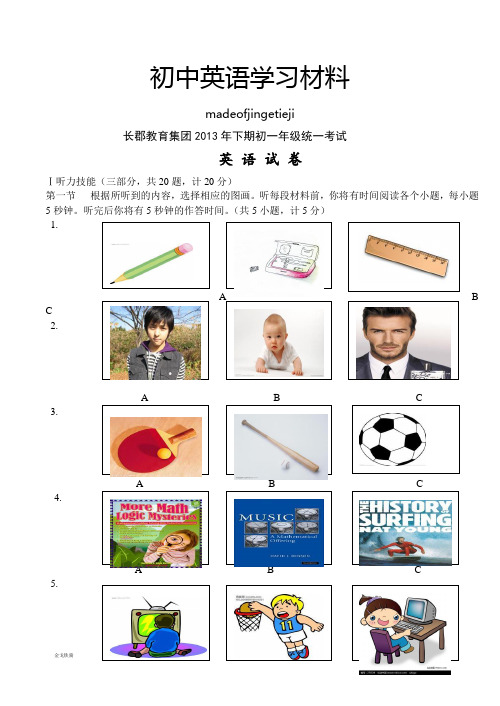
初中英语学习材料madeofjingetieji长郡教育集团2013年下期初一年级统一考试英 语 试 卷Ⅰ听力技能(三部分,共20题,计20分)第一节 根据所听到的内容,选择相应的图画。
听每段材料前,你将有时间阅读各个小题,每小题5秒钟。
听完后你将有5秒钟的作答时间。
(共5小题,计5分) 1.A B C2.A B C3.A B C4.AA B C5.A B C第二节对话理解。
听下面的对话,从题中所给的A,B,C三个选项中选出最佳答案。
听每段材料前,你将有时间阅读各个小题,每小题5秒钟。
听完后你将有5秒钟的作答时间。
(共10小题,计10分)听下面的对话,完成第6、7小题。
6. What color does Susan like?A. Blue.B. YellowC. Purple7. How much is the coat?A. $ 27B.¥72C.£37听下面的对话,完成第8、9小题。
8. When is the Art Festival?A. In MayB. In JuneC. In July9. What DON’T students do at Art Festival?A. Draw picturesB. Have a tennis matchC. Sing and dance听下面的对话,完成第10至12小题。
10. How many subjects does the girl like?A. ThreeB. FourC. Five11. Which subject does the girl think is interesting?A. EnglishB. MusicC. History12. What does the boy think of math?A. DifficultB. EasyC. relaxing听下面的对话,完成第13至第15小题。
13. What is Tom’s telephone number?A. 281-9376B. 218-9367C. 821-396714. What does Tom do on Saturday morning?A. He goes to his grandpa’s house.B. He does homework.C. He has math class.15. When will they play ping-pong?A. On SundayB. On SaturdayC. On Friday第三节笔录要点。
2013春新人教版七年级英语下册全课文翻译
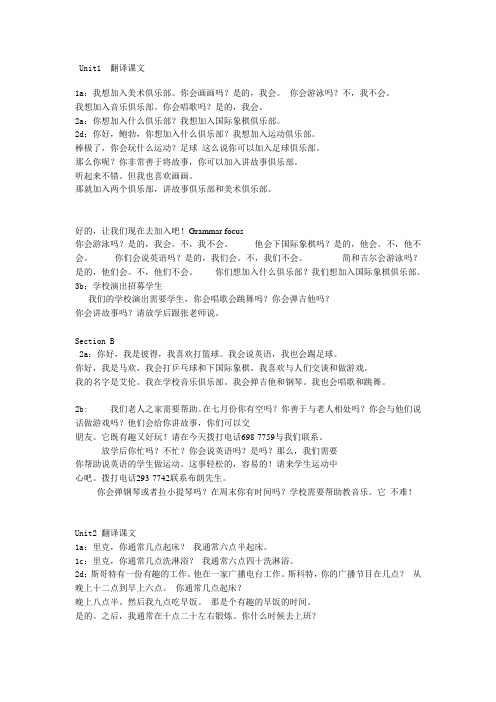
Unit1 翻译课文1a:我想加入美术俱乐部。
你会画画吗?是的,我会。
你会游泳吗?不,我不会。
我想加入音乐俱乐部。
你会唱歌吗?是的,我会。
2a:你想加入什么俱乐部?我想加入国际象棋俱乐部。
2d:你好,鲍勃,你想加入什么俱乐部?我想加入运动俱乐部。
棒极了,你会玩什么运动?足球这么说你可以加入足球俱乐部。
那么你呢?你非常善于将故事,你可以加入讲故事俱乐部。
听起来不错。
但我也喜欢画画。
那就加入两个俱乐部,讲故事俱乐部和美术俱乐部。
好的,让我们现在去加入吧!Grammar focus你会游泳吗?是的,我会。
不,我不会。
他会下国际象棋吗?是的,他会。
不,他不会。
你们会说英语吗?是的,我们会。
不,我们不会。
简和吉尔会游泳吗?是的,他们会。
不,他们不会。
你们想加入什么俱乐部?我们想加入国际象棋俱乐部。
3b:学校演出招募学生我们的学校演出需要学生,你会唱歌会跳舞吗?你会弹吉他吗?你会讲故事吗?请放学后跟张老师说。
Section B2a:你好,我是彼得,我喜欢打篮球。
我会说英语,我也会踢足球。
你好,我是马欢,我会打乒乓球和下国际象棋。
我喜欢与人们交谈和做游戏。
我的名字是艾伦。
我在学校音乐俱乐部。
我会弹吉他和钢琴。
我也会唱歌和跳舞。
2b: 我们老人之家需要帮助。
在七月份你有空吗?你善于与老人相处吗?你会与他们说话做游戏吗?他们会给你讲故事,你们可以交朋友。
它既有趣又好玩!请在今天拨打电话698-7759与我们联系。
放学后你忙吗?不忙?你会说英语吗?是吗?那么,我们需要你帮助说英语的学生做运动。
这事轻松的,容易的!请来学生运动中心吧。
拨打电话293-7742联系布朗先生。
你会弹钢琴或者拉小提琴吗?在周末你有时间吗?学校需要帮助教音乐。
它不难!Unit2 翻译课文1a:里克,你通常几点起床?我通常六点半起床。
1c:里克,你通常几点洗淋浴?我通常六点四十洗淋浴。
2d:斯哥特有一份有趣的工作。
他在一家广播电台工作。
斯科特,你的广播节目在几点?从晚上十二点到早上六点。
最新人教版七年级下册英语所有必考单词、词组-语法总结
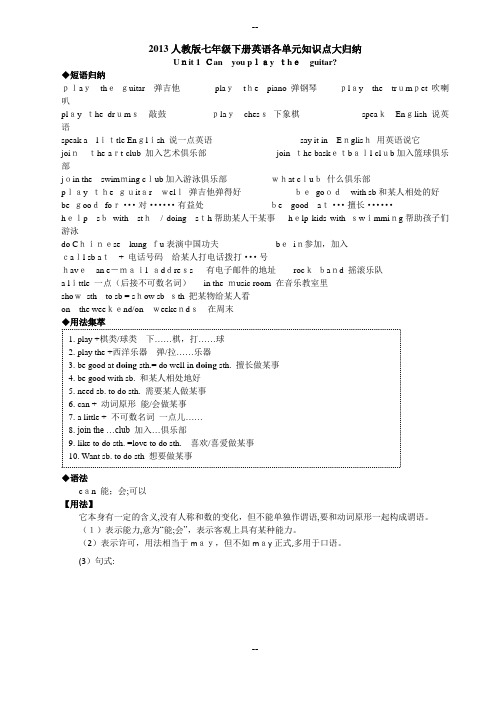
2013人教版七年级下册英语各单元知识点大归纳Unit 1 Can you play theguitar?◆短语归纳playtheguitar弹吉他playthe piano 弹钢琴play the trumpet吹喇叭play the drums敲鼓playchess下象棋speakEnglish 说英语speak a little English 说一点英语say it in English用英语说它jointhe art club 加入艺术俱乐部join the basketball club加入篮球俱乐部join the swimming club加入游泳俱乐部what club什么俱乐部play the guitarwell弹吉他弹得好begoodwith sb和某人相处的好be goodfor···对······有益处be good at···擅长······help sbwith sth/ doing sth帮助某人干某事help kids with swimming帮助孩子们游泳do Chinese kung fu表演中国功夫bein参加,加入call sb at+ 电话号码给某人打电话拨打···号havean e-mail address有电子邮件的地址rockband 摇滚乐队a little 一点(后接不可数名词)in the music room 在音乐教室里showsth to sb = show sb sth 把某物给某人看on the weekend/onweekends在周末◆用法集萃1. play +棋类/球类下……棋,打……球2. play the +西洋乐器弹/拉……乐器3. be good at doing sth.= do well in doing sth. 擅长做某事4. be good with sb. 和某人相处地好5. need sb. to do sth. 需要某人做某事6. can + 动词原形能/会做某事7. a little + 不可数名词一点儿……8. join the …club 加入…俱乐部9. like to do sth. =love to do sth. 喜欢/喜爱做某事10. Want sb. to do sth 想要做某事◆语法can 能;会;可以【用法】它本身有一定的含义,没有人称和数的变化,但不能单独作谓语,要和动词原形一起构成谓语。
2013版人教新目标英语七年级下全册教案
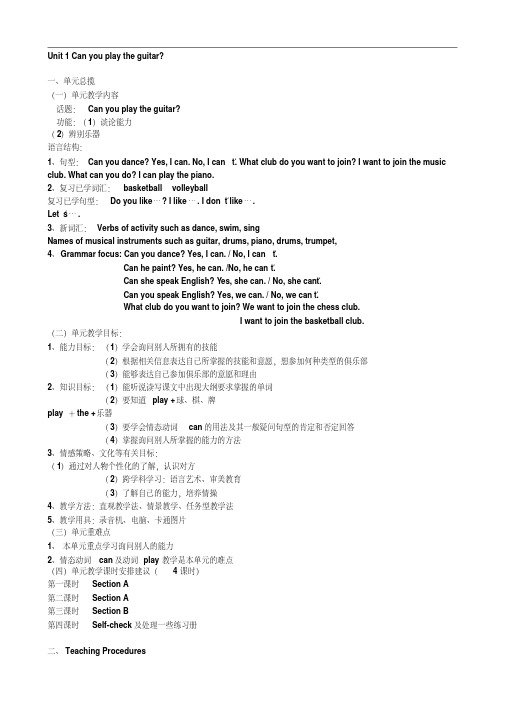
(二)单元教学目标:
I want to join the basketball ቤተ መጻሕፍቲ ባይዱlub.
1、能力目标: (1)学会询问别人所拥有的技能
( 2)根据相关信息表达自己所掌握的技能和意愿,想参加何种类型的俱乐部 ( 3)能够表达自己参加俱乐部的意愿和理由 2、知识目标: (1)能听说读写课文中出现大纲要求掌握的单词
2、复习已学词汇: basketball volleyball 复习已学句型: Do you like… ? I like … . I don ‘t like … .
Let‘s … .
3、新词汇: Verbs of activity such as dance, swim, sing
Names of musical instruments such as guitar, drums, piano, drums, trumpet, 4、 Grammar focus: Can you dance? Yes, I can. / No, I can ‘t.
Period 1:Section A1a –1c Additional materials to bring to class Harmonica and guitar or other two musical instruments to use in the language goal section PowerPoint with pictures of basketball, volleyball and some music instruments. Step 1 Revision and lead in The teacher says I like basketball. Then asks: Do you like basketball/ volleyball? Do you want to join a basketball club? Step 2 Presentation Ask the students to look at the pictures of , there are some clubs in it. Let ‘ s look at the clubsW. hat are they? They are art club, English club, chess club, swimming club and music club. What club do you want to join? Help the students to answer I want to join the art club and so on. If the school has clubs, the teacher can ask the students: What clubs do we have in our school? The teacher writes What club do you want to join? I want to join … on the blackboard. Ask the students to practice it. Then introduces the key vocabularies and the words can and can ‘t. The teacher says to the students who say he/she wants to join the basketball club: Can you play basketball? Help the students say Yes, I can. No, I can‘t. Then repeat with other actions or pictures, such as play volleyball. Show the students the activities the people in each club can do with the same step. Then repeat with dance, swim, play chess, paint, speak English and play the guitar with the help of doing the action. Or we can use the PowerPoint to help us to show the students what we can do. The teacher can ask the students to practice the following dialogues with can. Can you dance? Yes, I can. / No, I can ‘t. Can he paint? Yes, he can. /No, he can‘t. Can she speak English? Yes, she can. / No, she can‘t. Can you speak English? Yes, we can. / No, we can‘t.
2013新目标人教版七年级英语下册unit5同步练习
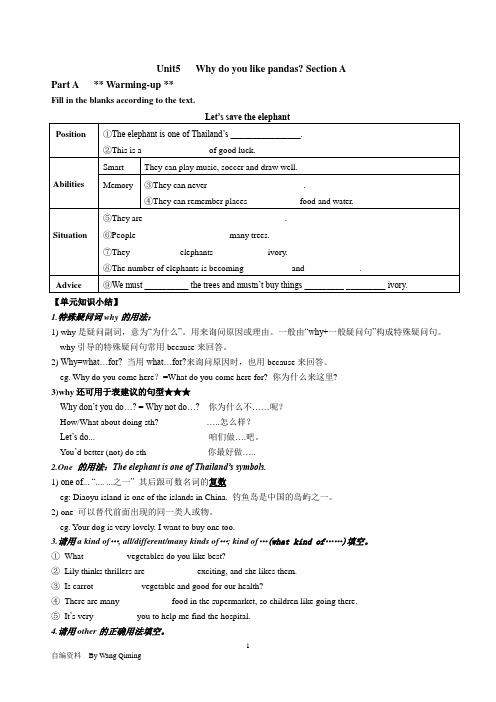
Unit5 Why do you like pandas? Section A Part A ** Warming-up **Fill in the blanks according to the text.Let’s save the elephantPosition ①The elephant is one of Thailand’s ________________.②This is a _______________of good luck.Abilities Smart They can play music, soccer and draw well.Memory ③They can never __________ ___________.④They can remember places ___________ food and water.Situation ⑤They are __________ ___________ __________.⑥People _________ ___________ many trees.⑦They ___________elephants ____________ivory.⑧The number of elephants is becoming __________ and ____________.Advice ⑨We must __________ the trees and mustn’t buy things _________ _________ ivory.【单元知识小结】1.特殊疑问词why的用法:1) why是疑问副词,意为“为什么”。
用来询问原因或理由。
一般由“why+一般疑问句”构成特殊疑问句。
why引导的特殊疑问句常用because来回答。
2) Why=what…for? 当用what…for?来询问原因时,也用because来回答。
最新人教版2013初中7年级下册英语课文带翻译
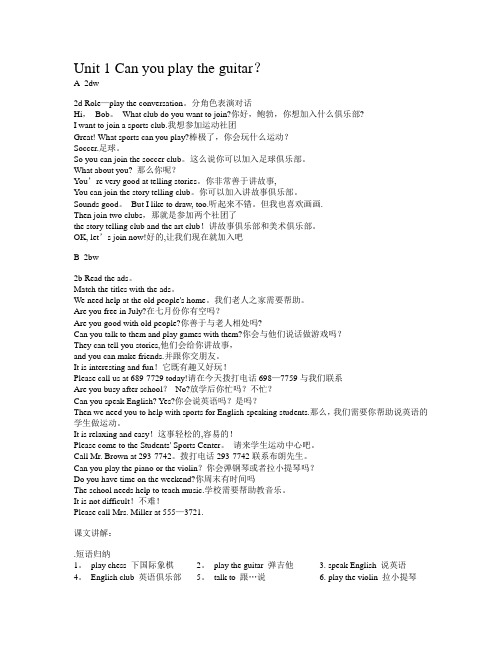
Unit 1 Can you play the guitar?A_2dw2d Role—play the conversation。
分角色表演对话Hi,Bob。
What club do you want to join?你好,鲍勃,你想加入什么俱乐部?I want to join a sports club.我想参加运动社团Great! What sports can you play?棒极了,你会玩什么运动?Soccer.足球。
So you can join the soccer club。
这么说你可以加入足球俱乐部。
What about you? 那么你呢?You’re very good at telling stories。
你非常善于讲故事,You can join the story telling club。
你可以加入讲故事俱乐部。
Sounds good。
But I like to draw, too.听起来不错。
但我也喜欢画画.Then join two clubs,那就是参加两个社团了the story telling club and the art club!讲故事俱乐部和美术俱乐部。
OK, let’s join now!好的,让我们现在就加入吧B_2bw2b Read the ads。
Match the titles with the ads。
We need help at the old people's home。
我们老人之家需要帮助。
Are you free in July?在七月份你有空吗?Are you good with old people?你善于与老人相处吗?Can you talk to them and play games with them?你会与他们说话做游戏吗?They can tell you stories,他们会给你讲故事,and you can make friends.并跟你交朋友。
新人教版七年级下册英语单词表资料
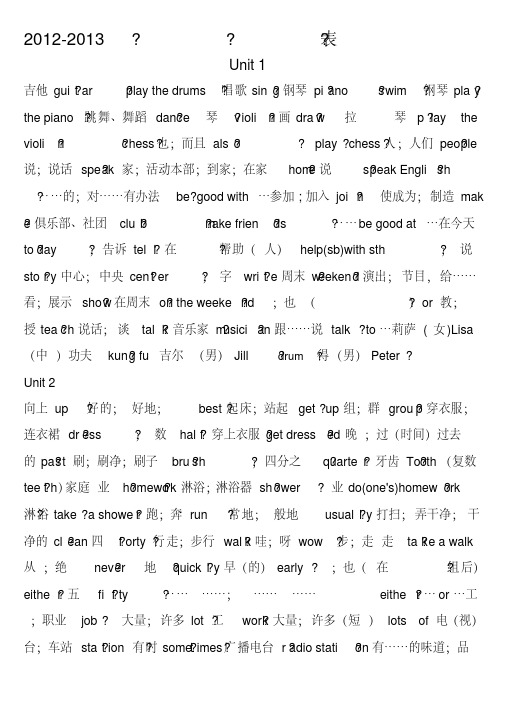
2012-2013???表Unit 1吉他gui?t ar?p lay the drums?唱歌sin?g钢琴pi?a no?s wim?钢琴pla?y the piano?跳舞、舞蹈dan?c e琴?v ioli?n画dra?w拉琴p?lay the violi?n?c hess?也;而且als?o?play?chess?人;人们peo?p le 说;说话spe?a k 家;活动本部;到家;在家hom?e说s?p eak Engli?s h ?……的;对……有办法be?good with…参加;加入joi?n使成为;制造mak ?e俱乐部、社团clu?b?m ake frien?d s?……be good at…在今天to?d ay?;告诉tel?l在?帮助(人)help(sb)with sth?;说sto?r y中心;中央cen?t er?;字wri?t e周末w?e eken?d演出;节目,给……看;展示sho?w在周末o?n the weeke?n d;也(?)or教; 授tea?c h说话;谈tal?k音乐家m?u sici?a n跟……说talk?to…莉萨 (女)Lisa (中)功夫kun?g fu吉尔(男)Jill?d rum?得(男)Peter?Unit 2向上up?好的;好地; best?起床;站起get?up组;群grou?p穿衣服;连衣裙dr?e ss?;数hal?f穿上衣服?g et dress?e d晚;过(时间)过去的pa?s t刷;刷净;刷子bru?s h?;四分之 q?u arte?r牙齿To?o th(复数tee?t h)家庭业h?o mewo?r k淋浴;淋浴器sh?o wer?业do(one's)homew?o rk 淋?浴take?a showe?r跑;奔run?常地;般地usual?l y打扫;弄干净;干净的cl?e an四 ?f orty?行走;步行wal?k哇;呀wow?步;走走ta?k e a walk 从;绝 nev?e r地?q uick?l y早(的)early?;也(在?组后)eithe?r五 fi?f ty?…………;…………eithe?r…or…工;职业job?大量;许多lot?工wor?k大量;许多(短)lots of电(视)台;车站sta?t ion有?时some?t imes?广播电台r?a dio stati?o n有……的味道;品尝;味道;滋味tas?t e……点(表示整点)o'clock?生活;生命lif?e(复数liv?e s)晚上;夜晚nig?h t里克R?i ck?的;好的?f unny?吉姆 (男名)Jim 锻炼;练习exe?r cise?斯科特(男名)Scott?(在)周末on weeke?n ds?(男名)Tony Unit 3火车tra?i n居住,生活liv?e车?b us车站?,停止sto?p地铁su?b way?为thin?k of地铁?t ake the subwa?y横过,越过cro?s s行车?b ike许?多many?骑行车r?i de a bike?庄,镇vil?l age?sixt?y介……之间bet?w een sev?e nty在?……和……之间bet?w een……and?e ight?y桥bri?d ge? ninet?y船bo?a t百h?u ndre?d索道ro?p eway?分min?u t,岁year?远,远的far?害怕,畏惧afr?a id里?,里kil?o mete?r像,怎样li?k e的n?e w 民v?i llag?e r每,每个eve?r y离开l?e ave每?天ever?y day?,睡,dre ?a m (工具)by的,的?t rue骑?行车by?bike?现,成为现c?o me ture开?车driv?e车,轿车cat?戴夫(男名)DaveUnit 4规则;规章rul?e脏的di?r ty到 ?a rriv?e厨房ki?t chen?准时(be)on time?多(的)more走?廊;过道hal?l way?闹的noi?s y大厅;礼堂hal?l放松;休息rel ?a x餐厅din?i ng hall?;阅 rea?d听;倾听lis?t en常?讨厌的;可怕的te?r ribl?e…听……liste?n to…感受;觉得fee?l打架;战斗fig?h t的?;厉的st? rict抱歉的;难过的;惋惜的so?r ry(对人)求be stric?t(with sb)在外;外的outsi?d e记住;记起rem?e mber?穿;戴wear?遵循;跟随fol?l ow 重的im?p orta?n t遵规?则foll?o w the rules?带来;取来bri?n g幸运;运气luc?k校服;制服uni?f orm?持;留kee?p安静的q?u iet?发;毛发hai?r外出out?学习;学会lea?r n外出(娱乐)go out 练习pra?c tice?克拉克(男名)Clark?碟;盘dish?埃米(女名)Amy?餐具do the dishe?s莫莉(女名)Molly?在……以前;以前bef?o re?N ew York?床make?(one's)bedUnit 5熊猫pan?d a好的?f rien?d ly动 ?园zoo?怯的;腼腆的sh?y老虎ti?g er救;救助sav?e大 el?e phan?t征sy?m bol?袋熊;考拉koala?旗;旗帜fla?g狮子lio?n忘记;遗忘for?g et?鹿gira?f fe?g et lost动?anim?a l地点;位置pla?c e的?;惰的la?z y危险d?a nger?聪明的sm?a rt?(极大)危险之中b?e in(great?)dange?r美丽的;美好的be?a utif?u l砍;切cut吓人的;恐怖的scary?(坐、躺、倒);向;沿着dow?n种类ki?n d砍倒c? ut down?微;有点儿ki?n d of tr?e e大 ?亚Aust?r alia?杀死;弄死kil?l南的;南;南 sou?t h牙i?v ory?洲Afri?c a超过,多;在……上 ove ?r南 Sou?t h Afric?a由……制成的(be)made of宠 p?e t朱莉(女名)Julie?腿leg?姬Beck?y猫cat?泰Tha?i land?睡觉sle?e p泰(人的);泰(的)ThaiUnit 6报纸new?s pape?r竞赛ra?c e看报纸?r ead a newsp?a per?人,东道 ho?s t使,运 use?学习,研究stu?d y汤so?u p州st?a te汤?m ake soup美 the?Unite?d State?s the Unite?d State?s of Ameri?c a wa?s h美的?A meri ?c an电影mov?i e龙dr?a gon看?电影go to the movie?s端午节Dr?a gon Boat Festi?v al 只是,恰好jus?t任的a?n y出去 ?饭eat out外?的othe?r房子hou?s e的?y oung?喝,饮料dri?n k儿童C?h ild(child?r en)茶,茶叶tea?怀念mis?s喝茶dr?i nk tea?w ish在?明天,明天,未来tom?o rrow ?可口的de?l icio?u s?,水 poo?l还,仍然sti?l l购,商店sho?p客厅li?v ing room超?市supe?r mark?e t夫?(男名)Steve?男人,人、man 拉?(女名)Laura?Unit 7雨;雨水rai?n夏天;夏季sum?m er多 ?的wind?y坐sit?多云的cl?o udy?汁;饮料jui?c e的?s unny?久;soo?n雪;雪snow?假期vac?a tion?天气wea?t her?假on(a)vacat?i on饭?c ook?力地;困难的ha?r d坏的;糟的bad?欧洲Eur?o pe园?p ark?山moun?t ain?息;消息mes?s age?;家cou?n try?个口;传话take a messa?g e 冰ska?t e他(he的?)him雪?的snow?y能;可以cou?l d冬天;冬季win?t er回来;回原 ba?c k斯?的;斯人;Rus?s ian回?电话cal?l(sb)back 雪?人snow?m an困难?;难题pro?b lem?雨的;多雨的ra?i ny?次;又次ag? ain干 ?的dry?(男名)Joe?的;的col?d杰夫(男名)Jeff?的hot 温暖的wa?r m莫斯科?M osco?w拜访;参观vis?i t多多?T oron?t o加大?C anad?a波士顿B?o ston?Unit 8邮政pos?t沿着al?o ng办 ?室offi?c e沿着(这条街)走go along?the stree ?t邮局po?s t offic?e转向;翻turn?警察pol?i ce 向右边;右边rig?h t警察局po?l ice stati?o n向边?;边lef?t旅店;酒店hot?e t向右、转tur ?n right?(turn left)银行ban?k街区;街坊nei?g hbor?h ood?院hosp?i tal?(时间、钱等)spend?大街str?e et时?间spen?d time?费pay?c limb?费电话p?a y phone?road?在……附近nea?r时常;常常oft?e n过;穿过acr?o ss气?a ir在……对 acr?o ss from?光suns?h ine前 fro?n t费的?f ree在?……前 in front?of享受;喜爱enj?o y在……后 beh?i nd喜 ?阅enj?o y readi?n g镇;市镇tow?n容易地e?a sily?到;大 aro?u nd钱m?o ney?;;的no?r thUnit 9卷曲的cu?r ly嘴m?o uth?的stra?i ght?形的rou?n d的t?a ll脸f?a ce中等的me?d ium?睛eye?;hei?g ht歌 ?s inge?r中等?b e of mediu ?m heigh?t艺术家a?r tist?瘦的thi?n犯重的h?e avy犯?罪crim?i nal?材buil?d放put?中等材b?e of mediu?m build?每个,各 eac?h今夜to?n ight?式,线way?的lit?t le?d escr?i be点?,少量a littl?e同的d?i ffer?e ntly?电影院ci?n ema?,又 ano?t her?镜glas?s es?,尽 end?以后lat?e r 后i?n the end?的hand?s ome?正的rea?l演员ac?t or?裤jean?s女演员ac?t ress?翰 Jo?h nny人?p erso?n迪安De?a n鼻子n?o se?(女名)Tina 金黄色的b?l onde?杰克逊(姓)Jacks?o nUnit 10条noo?d le?;薄 pan?c ake?肉mutt?o n世界w?o rld?肉beef?世界各地a?r ound?the world?卷心菜;洋白菜cabba?g e答案;回答ans?w er 土豆;马铃薯po?t ato?同的dif?f eren?t特色菜;特价品;特别的;特殊的sp ?e cial?蛋糕cak?e(表示意愿)愿意wou?l d蜡烛c?a ndle?愿意;喜 wou?l d like龄age?(常??)还;仍然yet?许愿make a wish大号的;大的large?吹blow?点菜;命令ord?e r吹灭b?l ow out点菜tak?e one's order?如if大?;尺码siz?e会wil?l碗bowl?the?UK \the Unite?d Kingd?o m (大)碗one(large?)bowl of糖 can?d y豆腐t?o fu幸运?的luck?y(可食的)肉m eat受?迎的;普遍的po ?p ular?饺子dum?p ling?受迎;流行get?popul?a r粥;糊por?r idge?切碎cut?up 洋葱o?n ion?法;意ide?a鱼;鱼肉fis?h给……带来好运b?r ing good luck to…Unit 11挤奶mil?k太 su?n奶 co?w博馆m?u seum?给奶挤奶?m ilk a cow火 ?f ire马hors?e消防站f?i re stati?o n骑马r?i de a horse?油画;绘画pai?n ting?喂养;饲养fee?d(过去式fe?d)使人的?;令人动的?e xcit?i ng喂鸡fee?d chick?e ns可爱?的love?l y农民;农场 farme?r昂贵的e?x pens?i ve 相当;安全qui?t e价的?;便宜的ch?e ap许多?q uite?a lot(of…)缓慢的;迟缓的sl?o w(常??)任何东西,任何a?nythi?n g地(的)fast 种植;生;发育gro?w(过去式gr?e w)机器人ro?b ot农场?;务农;种田far? m导;向导gui?d e采;摘pick?礼;赠品gif?t极好的;优秀的excel?lent ?的说来al?l in all?;农 cou?n trys?i de切?;所有e?v eryt?h ing 在;在农 in the count?r ysid?e感的?i nter?e sted?昨天yes?t erda?y 对……感be?inter?e sted?in fl?o wer?暗的;昏暗的da?r k担心;担忧wor?r y听到;听见hear(heard?)幸运地;好运地lucki?l y卡尔(女名)Carol?Unit 12扎营cam?p中学hi?g h schoo?l湖,湖泊lak?e以前ag?o海滩,沙滩bea?c h印 I?n dia?毛球运动b?a dmin?t on?t ent?,绵 she?e p 搭起,举起put?up 为,当 as?亮moon?然的na?t ural?惊,惊讶sur?p rise?蝴蝶but?t erfl?y 惊ge?t a surpr?i se客?v isit?o r蛇sn?a ke?的tire?d惊慌的s?c ared?停留sta?y移动mo?v e夜 ?留stay?up late对?……大声喊叫s?h out to…离开awa?y开始,着 sta?r t跑开r?u n away跳?跃jump?老鼠mou?s e(复数mic?e)上上u?p and down?的bab?y弄醒,醒wake?(过去式wo?k e)呼叫,喊叫sho?u t把……弄醒wak?e……up冲……大声叫嚷shout?at…到……里 int?o(狗叫声)汪汪woof?林fore?s t言l?a ngua?g e耳朵e?a r飞fly?西Lucy?筝kit?e放筝f?l y a kite?的(地)high。
